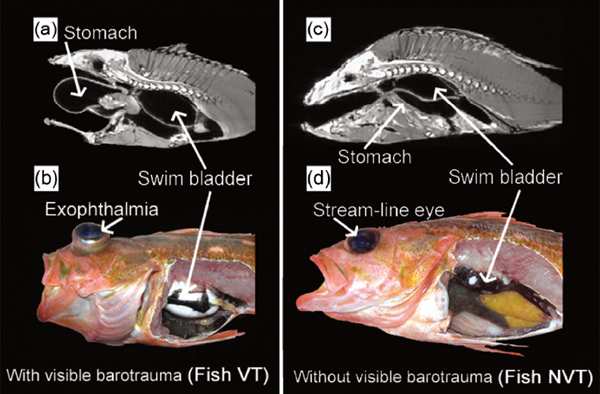
Use of venting needles to deflate the swim bladder should be used only as a last resort (there is a chance of damaging internal organs if done incorrectly). A release weight can be made easily by securing a barbless hook to a heavy weight or large sinker. It is recommended that anglers use a release weight to return excessively buoyant fish to depth.

Methods used to treat barotrauma depend on the severity of the symptoms. As an angler quickly brings a fish up from deep water, the pressure of the fish’s environment decreases, causing its swim bladder to expand. Barotrauma has been frequently assessed in fish during the warm water. Barotrauma is bodily injury to a fish caused by sudden changes in pressure. Learn more about other factors that can reduce survival Barotrauma is a frequent event in fish captured from depth, and anglers often attempt to remedy this problem by venting fish. The symptoms of barotrauma may not be evident in fish caught from very deep water as the swim bladder can burst. In an effort to treat fish with barotrauma, anglers may vent the fish by inserting a needle into the swim bladder to release expanded gases, but the effectiveness of venting in facilitat - ing recovery is unclear (Butcher et al., 2012 Wilde, 2009). The physical effects and severity increase with depth of capture, and susceptibility varies between species. Juvenile Chinook salmon, Oncorhynchus tshawytscha, were exposed to simulated high intensity pile driving signals to evaluate their ability to recover from barotrauma injuries. Physical effects of barotraumas include inflated swim bladder and intestines, bulging eyes and stomach pushed out through the mouth or gill cover. The pressure in the water increases 1 atmosphere approximately every 33 feet.

Physical signs of barotrauma include protrusion of the stomach from the fish’s mouth, bulging eyes, bloated belly, bubbling scales, and distended intestines. Barotrauma causes internal damage and may prevent the fish from swimming. Barotrauma is bodily injury to a fish caused by sudden changes in pressure. When this occurs, fish may be unable to return to depth after you release it. These rapid pressure changes can cause fish to suffer a range of injuries, known as barotrauma. It occurs when a fish is hauled to the surface and the air within the fishs swim bladder expands as pressure decreases. Fish that are rapidly retrieved from depths greater than 10 metres do not have time to adjust to water pressure changes, resulting in the expansion of gases in the swim bladder and other organs.


 0 kommentar(er)
0 kommentar(er)
